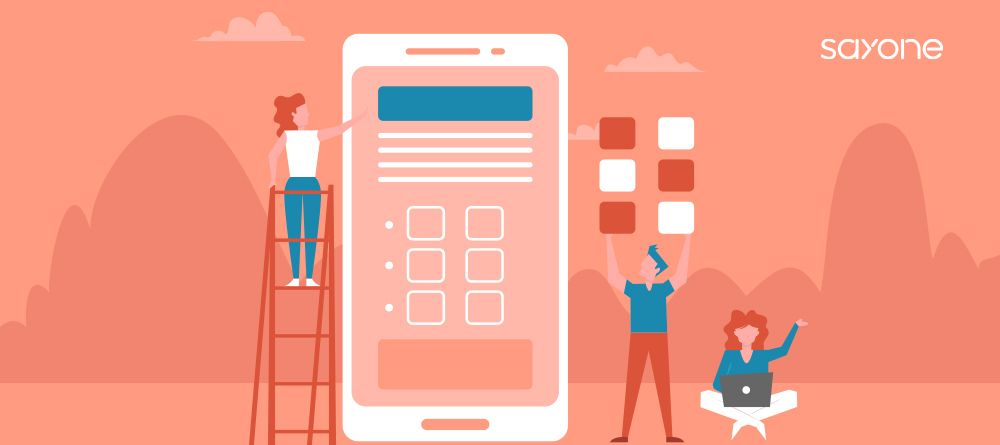
Subscribe to our Blog
We're committed to your privacy. SayOne uses the information you provide to us to contact you about our relevant content, products, and services. check out our privacy policy.

Sayone technologiesApril 4, 20236 min read

Generating table of contents...
In this blog post, we explore the different types of mobile app testing that must be carried out before launching the app in the app store. Also, we have listed the most popular mobile application testing tools used in the industry today.
The installation process is a user's first interaction with any mobile app and must be error-free. If any issues are evident at this stage or if it takes longer to install an app, the customer will look for an alternate one.
Key test scenarios to take heed of during mobile app installation testing:
These tests should be conducted during app installation and the result whether it results in crashes, whether the process hangs, or whether error messages are displayed to the user, should be observed.
Functional testing is done to ensure that every functional aspect of an app has been implemented and working in the desired manner. This is the first type of testing to be carried out by the team responsible for mobile app testing.
App users will uninstall the app at once if the app does not function as it should. Therefore, this is a critical test. Mobile testing tools help you to perform hands-on mobile app testing on thousands of real devices in real time.
Conducting the usability test ensures the mobile app makes for easy usage. An intuitive app design layout, easy navigation options, presence of buttons, choice of colors, faster response to any action performed, etc., impact user experience.
Download our eBook for FREE “Global Software Development Rates – an Overview”.
It is vital to involve real users when performing usability testing so that you can appropriately act on the feedback and ensure the app passes this test. Without passing usability tests, any app is sure to fail in the hands of its users. It would result in the reputation loss of your organization in the long run
This is one of the most important mobile app testing types. This consists of non-functional testing which ensures whether a mobile app’s functionality remains the same across different OS, applications, internal hardware specifications, devices, and network conditions.

Compatibility testing can be either backward compatibility testing or forward compatibility testing. Backward compatibility testing helps to ensure the behavior and compatibility of newly developed versions of hardware or software with previous ones. Forward compatibility verifies the behavior and compatibility with newer versions.
Read our blog “Benefits of Serverless Architecture for Mobile App Development”.
Localization testing is done to ensure the software behavior and accuracy are suitable for specific places and areas when the app is created to be used in many markets with different languages across the world. The test simulates how the software will react in specific scenarios and make it culturally relevant.
This mobile app test is conducted on how the app responds to interruptions during actual functioning. When using the app, sometimes we have to switch over from one app to another for different reasons: making a call, sending a chat, receiving notifications, changing volume settings, etc. These breaks should not negatively impact the mobile app’s functionality or performance. Different scenarios are tested by switching to the different apps manually before returning to the running mobile app. However, to cut down on the time taken for this manual test, it is a good idea to automate the interruption testing process.
A memory leak happens if a running program does not return the memory it has acquired for temporary usage. This causes the app’s available memory to run out and it becomes unusable. Memory leaks happen because of code errors, and the app should be checked for this problem.
We believe in long-term win-win relationships with our strategic partners. If you want to migrate to Serverless Architecture, call us today!
Memory leak testing is accomplished by running an app on many devices with varying memory capacities to determine the app’s performance on these devices. The program is then tuned to work well for each configuration.
Performance tests help developers to discover bottlenecks in their mobile apps. Normally, they subject a mobile app to different conditions and note down their observations. The performance test strategy should evaluate the below-mentioned aspects:
A security threat is a critical aspect of any mobile app. Mobile app security testing helps to prevent:
Upgrade testing helps to cover different test scenarios of the installation process, ensure to carry out the following testing aspects:
Download our eBook for FREE “Maximizing Mobile App Security with Blockchain Technology”.
The various types of mobile app testing have to be considered in any mobile app’s development life cycle process.
It is vital to consider the different components involved in the mobile app tech stack and there should be a plan to test every component before the app is launched.
Discuss your next mobile app idea with us today!
At SayOne, our integrated teams of developers service our clients with web and mobile applications that are fully aligned with the future of the business or organization. We design, develop and implement applications using Agile and DevOps methodologies. Our system model focuses on programs that are resilient, fortified, and highly reliable.

We're committed to your privacy. SayOne uses the information you provide to us to contact you about our relevant content, products, and services. check out our privacy policy.

About Author
Fuelling Happiness.

We collaborate with visionary leaders on projects that focus on quality